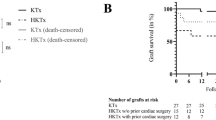Abstract.
Delayed graft function (DGF) in renal transplantation using non-heart-beating donors (NHBDs) usually exceeds 80%. There is debate whether DGF in this subgroup is associated with poor long-term outcome. Between 1 January1988 and 31 January 2000, 130 of 158 (82.3%) NHBD graft recipients with functioning grafts transplanted within our regional NHBD programme developed DGF. Overall graft survival and graft survival censored for recipient death was 113/130 (86.9%) versus 113/121 (93.4%) at year 1, 55/84 (65.5%) versus 55/64 (85.9%) at year 5 and 18/40 (45.0%) versus 18/28 (64.3%) at year 10 after transplantation. Seventeen grafts (13.1%) were lost due to rejection or graft nephropathy. Nine of these kidneys failed during the 1st year. Twenty-seven patients (20.8%) died with functioning grafts, eight within the 1st year after transplantation. In those patients who survived, DGF was associated with excellent long-term outcome in this study. The number of grafts lost due to recipient death exceeded those lost due to rejection or graft nephropathy.
Similar content being viewed by others
Author information
Authors and Affiliations
Additional information
Electronic Publication
About this article
Cite this article
Gerstenkorn, C., Deardon, D., Koffman, G.C. et al. Outcome of renal allografts from non-heart-beating donors with delayed graft function. Transpl Int 15, 660–663 (2002). https://doi.org/10.1007/s00147-002-0471-4
Received:
Revised:
Accepted:
Issue Date:
DOI: https://doi.org/10.1007/s00147-002-0471-4




